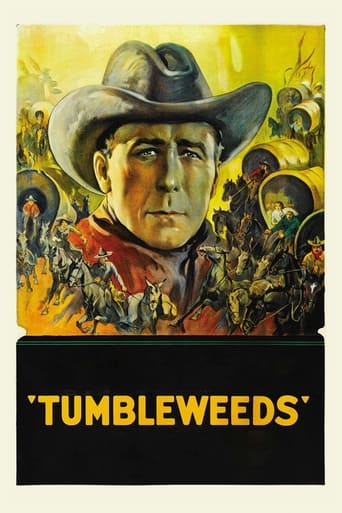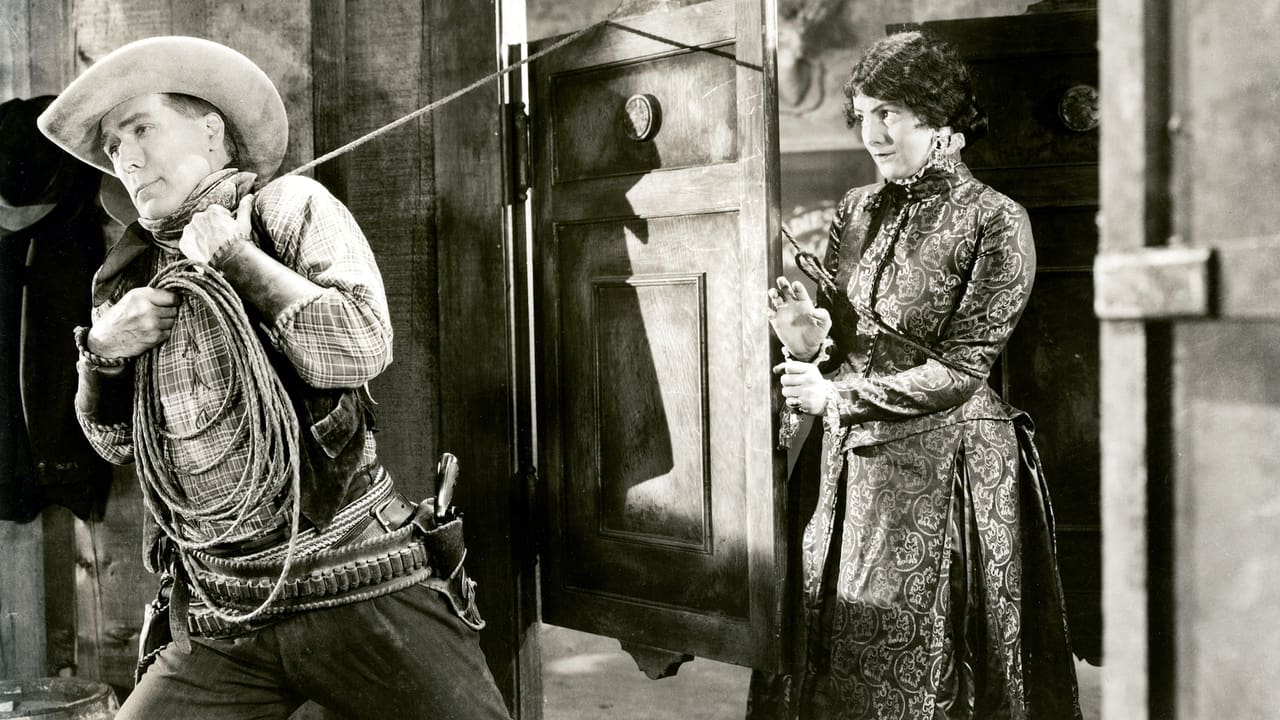JLRVancouver
One of the last silent westerns and William Hart's swan song, "Tumbleweeds" is about the settlement of the 'old west' and the end of the (largely mythical) 'cowboy' way of life. The closing shot of drifting tumbleweeds being stopped by barb wire fence pretty much sums up the film. William Hart is 'Don Carver', a drifter, a 'tumbleweed', who gets caught up in the 1993 Cherokee Strip land rush along with his sidekick, 'Kentucky Rose' (Lucian Littlefield). Typical of silent films, the acting is somewhat overly dramatic at times (except for po-faced Hart) but otherwise the film has held up remarkably well and, to some degree, reflects modern sensibilities more than many of the myriad westerns that followed (for example: the Indians Carver encounters are his friends and there are African Americans and capable, independent women in the race for homesteads). There are a number of very effective scenes, such as the countdown to the "maddest stampede in American History', the stampede itself, and shots paralleling Hart riding at full gallop that must have been challenging to obtain. The film is also quite comic at times, notably the ol' widder women checking out Kentucky's butt when he bends over or tough-guy Hart's faintness around women and his solution to a persistent cowlick before going a'courtin'. The biggest downside to the version I watched (on the "Silver Screen Classics" channel) was the score, which (IMO) was often intrusive and inappropriate to the scene. I don't know if other versions are available. Score aside, the film is well worth watching for its own sake, as well as for its place in cinematic history. Followed six years later by "Cimarron", a similar retelling of the great land race that was the only Western to win a Best Picture Oscar until "Dances with Wolves" in 1990.
romanorum1
For many years prior to 1889, the US government leased the lands of the Indian Territory to cattleman for grazing their cattle herds. Ranches were built. Now the ranchers had to leave by April 1889 as 1200 square miles of the Oklahoma territory were being opened to new homesteaders. (There would be other Oklahoma land runs throughout the 1890s.) Hart's character, Don Carver, is the typical quiet and intense cowboy known as a "tumbleweed," a drifting cowhand. Carver and his comedic sidekick Kentucky Rose (Lucien Littlefield) ride into the town of Caldwell, Kansas, population 200. This is the calm before the storm as homesteaders begin to pour into town for the big land run. Carver, and later Kentucky, decides to register for the rush, to acquire a piece of free land. The US Cavalry, in charge, has posted warnings that those who jump the starting line before the appointed time will be arrested as "sooners" and kept in a pen until after the land rush. Seedy Bill Freel, a/k/a Burton (Richard Niell), craves Joe Hinman's Box K Ranch on the Strip (abandoned by decree) as it controls the waterways of the area. He has a devious plan to sneak across the starting line before the assigned date and time. His new partner is nefarious Noll Lassiter (J. Gordon Russell), half-brother of Molly Lassiter (Barbara Bedford). Freel has a yearning for Molly, who loathes him. She has instead developed a relationship with Carver, nearly forty years her senior in real life. Like Freel, Carver also has his eyes on the Box K property (where he formerly worked), including the ranch house. When Don rides back into the Strip to look for and round up some straying cattle, he is arrested by US Cavalry Major White (Taylor Duncan) at the instigation of Freel and Noll Lassiter. These sordid characters have falsely accused him of being a "sooner." Now by law Carver is kept in the bull pen until after the land run. How Carver escapes is quite innovative, and he happens to have the fastest steed nearby. If only he can make up the lost ground and stake the Box K Ranch grounds. When William S. Hart reissued this 1925 silent film (his last and perhaps greatest) in 1939, he preceded it with his famous eight- minute "Farewell to the Screen" introduction. Knowing the real West, Hart had arrived in Hollywood in 1914 at the mature age of 49 and acted for eleven years. He and Tom Mix were the greatest cowboys of the silent screen. Hart's partner here, Lucien Littlefield, specialized in playing older roles. In "Tumbleweeds" he looks about sixty even though he is only thirty. Although not as good as "The Iron Horse" (1924), the greatest silent western of them all, "Tumbleweeds" is still worth a look, especially because of the rousing land rush scene, an epic shot from the days of silent cinema.
MartinHafer
William S. Hart plays a tough and laconic cowboy--the sort of guy who loves the life and has no desire to settle down and get a place of his own. However, he meets a pretty lady (Barbara Bedford) and immediately decides that marrying and settling down is a GREAT idea. So, as the Oklahoma land run is about to commence, he decides to take part in this insane opportunity to get a homestead.Let me digress a bit to explain. In 1889, a law was signed that opened up 2,000,000 acres of land in Oklahoma to settlers. However, instead of signing up for it to stake your claim, they literally staged a race--where folks rode like crazy into the open land and grabbed a marker. Then, upon returning it to the government agent, they'd be given that particular parcel. And so, if you wanted the best land (such as along a river), you had to be fast--or cheat (these folks was given the nickname 'Sooner' because they went in BEFORE they were officially allowed).What Hart does not know is that the lady's half-brother is trying to cheat in order to get the best land AND he sets up Hart to make it look like he's trying to be a Sooner instead! Can William manage to expose this jerk AND still win the sister's love? Like so many of Hart's films I have seen, Hart is a rather quiet fellow who lets his fists do the talking. He is NOT some pretty boy and he seems to look more like you'd expect a real cowboy to look. While this is not among his very best films, it's well made and talks about one of the most forgotten parts of US history--the land runs. Worth seeing.By the way, the copy I had was silent but had musical accompaniment that was added later.
funkyfry
The legendary William S. Hart's last film is a large scale homage to the passing days of the Old West, with star Hart portraying a grizzled veteran cowboy who sees the death of his lifestyle in the Oklahoma land rush and the last great cattle drives. It is often visually moving, but not very psychologically astute (nor perhaps does it attempt to be).Hart's character Don Carver falls for a young woman named Molly (Barbara Bedford) who has come west to try to make a land claim along with her older (J. Gordon Russell) and younger (Jack Murphy) brothers. Unbeknownst to her, the elder brother is making plans with a villainous criminal (Richard Neill) to take the best spot of land and leave Molly out in the cold. They frame Carver as a "sooner", so that he can't help Molly. But Carver escapes from his prison and rides at breakneck speed across the plains to try to win the land for his lady love.The scenes towards the end with the land rush are quite impressive in scale, and the fast riding Hart really impresses with his own stunt prowess. It's the very definition of a "set-peice" scene, basically a film version of one of the Wild West shows that used to be so popular at Expos and so forth (Buffallo Bill's show being the most famous). However I felt a bit let down by the actual fighting... the two bad guys didn't really fight Hart, they just ran away like cowards. I suppose that was the point, but it makes for a less exciting western when we don't get to see a good shoot-out.Hart's presence is excellent, but his actual performance is at times laughable. Never moreso than at the very conclusion of the film, when he wipes his brow and gives the camera a look of anguish that would have embarrassed even some of his Shakespearean brethren (Hart was a classically trained actor, and it shows). He's excellent in the early scenes when his presence is more stoic, but whenever the film asks him to show emotion he betrays it with showy affectations.I'm glad I saw it, if only as a history lesson in western film. The movie is not as goofy as a lot of the westerns from that time, but also not quite as self-serious as Ford's silents. It's a film that knows its place as a spectacle entertainment, and also manages to convey the sadness and majesty of the last days of the West.


 AD
AD


